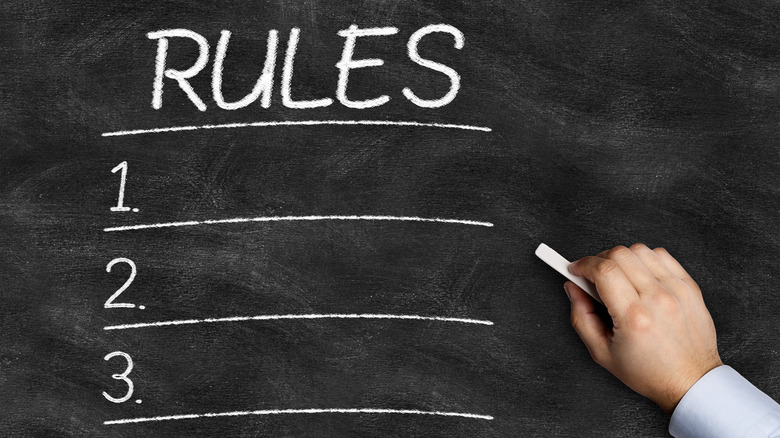Everything You Need To Know About The 75 Hard Challenge
The 75 Hard challenge is notorious for being one of the toughest fitness challenges out there, meant to strengthen mind and body. Created by Andy Frisella, the challenge is a rarity in that it's completely free. It's also not strictly a fitness challenge. On his website, Frisella refers to it as a "transformative mental toughness program."
It's important to note that Frisella does not have any personal training or nutrition qualifications, meaning he created this program from his own experiences (per Men's Health). There's an app that can help guide you and a large community of people on TikTok who are either undertaking the challenge or sharing their results.
If you're excited at the thought of being mentally transformed in a tough love kind of way (read: very tough, not much love), 75 Hard could be the challenge for you. However, you shouldn't jump in headfirst without knowing all of the information. The 75 Hard program is designed to completely uproot your life and habits — but is it right for you? Here's everything you should know about 75 Hard.
The first rule of 75 Hard is possibly the toughest
As outlined by Today, the 75 Hard challenge has six main rules. These rules aren't necessarily complicated, but they are strict. In fact, the very first rule is that you cannot forsake any of the rules.
If you don't complete the other five rules (or tasks) daily, you'll have to start the challenge again. Yes, that's right. Not the day, but the entire challenge, and that goes for whether you're on day two or day 74. Andy Frisella's reasoning for this is that life is never perfect, but, by pushing through, you'll overcome a quitting mindset.
The second rule is that you must do two 45-minute workouts each day (via Cosmopolitan). A sub-rule of this rule is that one of these workouts must be outside, though Frisella does not specify why. If that sounds like a lot, it is.
Registered dietician Albert R. Matheny believes that this workout plan is an unsustainable way to achieve your goals. Additionally, he stated that going from nothing to working out twice a day with no guidance will be a shock to the system that could cause injury and harm your mental heath.
Two of the rules revolve around diet
If you're still intrigued, one of the major rules of 75 Hard is that you must pick a diet to stick to for the entire 75 days — no deviations allowed (via Shape). This rule fits in with one of the others, which is that no cheat meals are allowed.
Creator Andy Frisella doesn't specify which diet you have to follow, just that you must stick to it. This could be your chance to follow the plant-based or vegan diet you've been wanting to try or go for something more specific, like the Mediterranean diet.
Interestingly, it's not specified what counts as a cheat meal. Nevertheless, as with other aspects of this challenge, this rule could be problematic for some. Speaking to Forbes, registered dietician Noah Quezada warned that the strictness of the diet plan "can make it difficult to stick to [in the] long term and may even lead to an unhealthy relationship with food."
Some of the 75 Hard rules may be detrimental
Another diet-related rule of the 75 Hard program is that you must drink a gallon of water per day (via Today). The truth about how much water you should drink each day will vary from person to person, but, if you're completing the 75 Hard program, a gallon is your new go-to.
Andy Frisella admits that he dropped the ball on this rule a few times and had to chug water before bed, which is never ideal. If you're not an avid water drinker already, you might want to set timers for throughout the day to remind you.
Per Women's Health, nutritional therapist Eleanor Thrupp approves of this rule and states that drinking more water will give you more energy, though she does admit that a gallon may be too much for some people.
Nutritionist Alex Parren also expressed his concern about the gallon rule, saying that drinking too much water per day could have a bad effect on some people and even lead to "negative physiological consequences." He believes that water intake should be personalized for each person based on factors like body weight, exercise regime, and muscle mass.
Self-improvement is a major focus of the challenge
Finally, the last two rules focus on self-improvement and progress. The first is that you must read 10 pages of a book per day (via Today). In his typically straightforward style, Andy Frisella states, "This is not entertainment time, this is not 'Harry Potter' time, this is learn new stuff time." If you've been searching for some new self-help books, this could be a good way to start a habit.
The final rule is that you must take a progress photo every day. These photos are just for you and do not need to be shared with others. Still, fitness blog CROSSROPE points out that progress photos contradict Andy Frisella's claim that 75 Hard is about "mental toughness" rather than physical changes. If you aren't at peace with your body, it could be tough to take a photo daily when you're used to avoiding the mirror, making this rule another one that should be approached with caution.
Remember that 75 Hard isn't for everyone
If you're looking for a fresh start and have tried many challenges before, 75 Hard could be for you. This is backed up by personal trainer and nutrition coach Rachel MacPherson, who says that the best thing about the program is its emphasis on consistency (via Parade). For some, Andy Frisella's no-nonsense approach could be the kick that's needed. For others, the challenge could exacerbate insecurities and accentuate existing issues.
Moreover, keep in mind that adhering strictly to the challenge could cause body issues, disordered eating habits, and a toxic mindset regarding exercise and diet (via Insider). Trainers also say that the challenge could easily cause exhaustion that quickly leads to burnout. It can be easy to get sucked into an all-or-nothing mindset, especially when you're surrounded by a like-minded community on social media.
The main thing is to decide if the challenge is right for you and then take it one day at a time, rather than feeling pressured to complete tasks that could cause you more harm than good in the long run.





